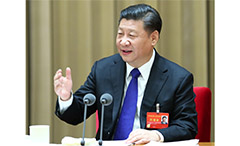UBS forecasts high-quality economic growth for China
2017-12-21
english.gov.cn
United Bank of Switzerland (UBS) predicted continuing progress in the overall quality of China’s economic development in spite of the impact of an economic downturn, at a conference held in London regarding the global macro-economy and market in 2018, Economic Daily reported on Dec 20.
The economic downturn resulted from the Chinese government’s concern about the quality of economic development and its active regulation and control, said Bhanu Baweja, head of emerging market strategy at UBS Investment Bank.
Despite being curbed, the slowdown in real estate won’t exert a worrisome impact on the economy, as it has been proceeding in a mild manner with a relatively low inventory and market resilience boosted by the ongoing industrial restructuring, said Baweja.
It’s worth noting that China’s economic structure will continue to improve in 2018, with consumers playing a bigger part. The remarkable growth in citizens’ income, improvements in public services and social security network, and the exceedingly convenient consumption credit system jointly propel the growth in consumption, the speedup of which is estimated to surpass 7 percent, said a global macro strategist at UBS.
According to UBS, the supply-side structural reform and deleveraging will be at the core of China’s macroeconomic development. By one estimate, China will step up its market supervision and the reform of State-owned enterprises (SOE), which will further enhance the profitability of enterprises in the industrial sector, and pave the way for the acceleration in capital flow and technological upgrading in this field.
In addition, China is on course to intensify its financial supervision, especially on financial leverage and shadow banking system from 2018 to 2019. However, the continuing deleveraging is not likely to hinder growth in the real economy, because its gradual progress allows the market to follow. Meanwhile, the ongoing supply-side structural reform is constantly diluting enterprises’ reliance on credit, which also creates a sound environment for deleveraging.


